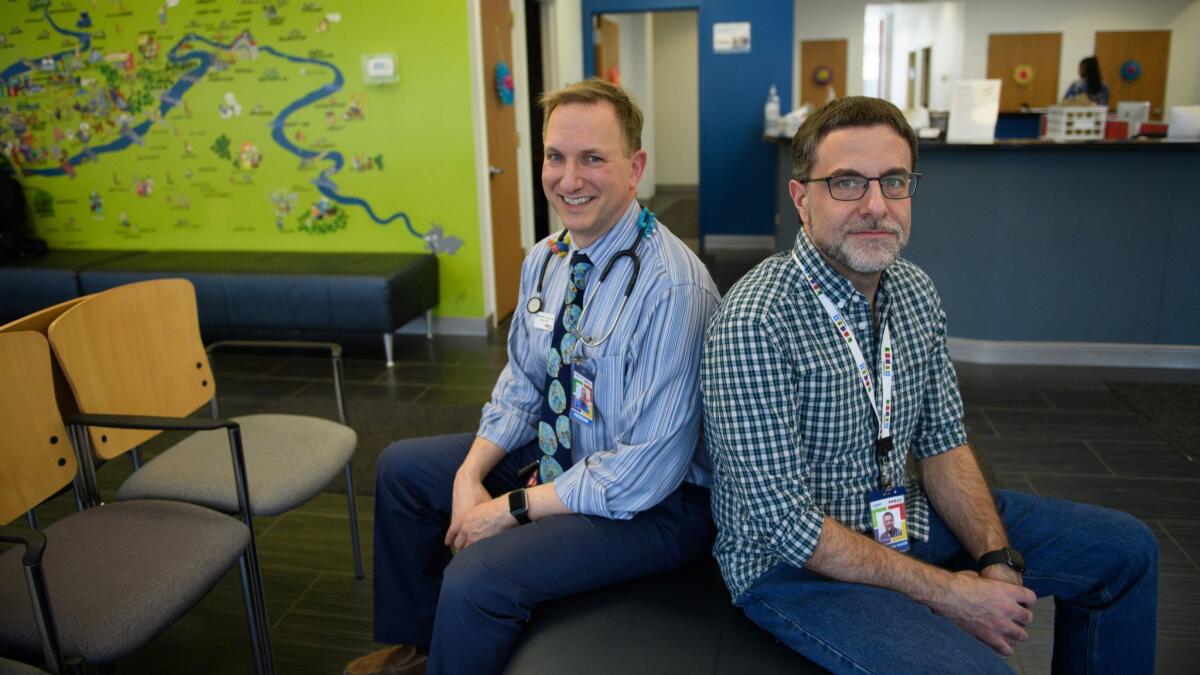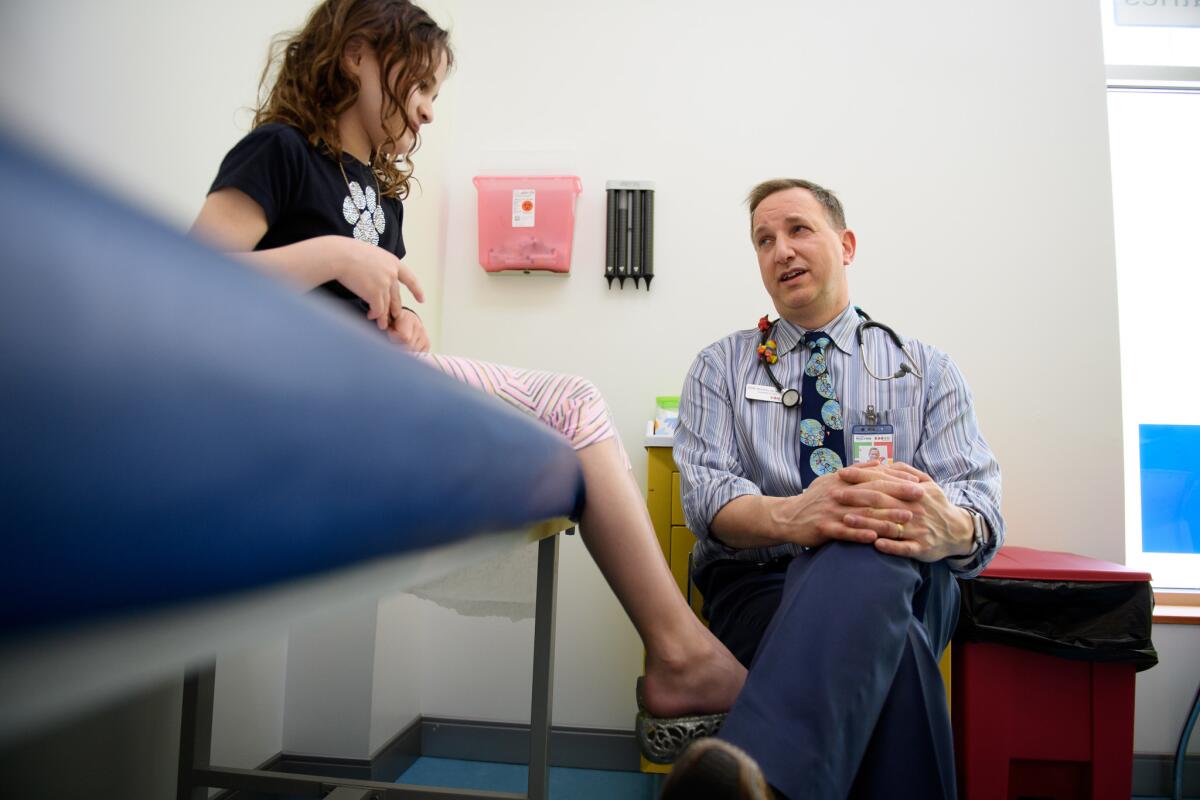Anti-vaccine activists have doctors ‘terrorized into silence’ with online harassment

- Share via
Dr. Dana Corriel wrote on Facebook in September that the flu vaccine had arrived and encouraged patients to come to her office for a shot.
Within hours, the post was flooded with thousands of comments from people opposed to vaccines. Corriel initially decided to allow the postings to continue, hoping to use the moment to educate people about the importance of immunizations.
But then she began to feel threatened. People she had never treated gave her one-star ratings online. Commenters called her a “pharma vaccine whore” and a “child killer,” according to screenshots shared with The Times. Someone looked up her office address in New York City and mailed her an anti-vaccine book.
“That was a little too close to home,” said Corriel, an internal medicine physician. “I held out for a few days, but I couldn’t take the attention and all the craziness and I deleted the post.”
As measles cases pop up across the United States, public health advocates have blamed social media for allowing misinformation to take root and swiftly spread. But the platforms also facilitate far more antagonistic behavior, with doctors facing online harassment and even coordinated attacks for promoting vaccines.
Since late 2017, there have been more than 50 of these online campaigns against health providers who promote vaccines, some of which have led to threats of harm that prompted calls to the police, said Chad Hermann, communications director for Kids Plus Pediatrics, a Pittsburgh practice that faced one of these online attacks in 2017 and then began tracking them.
Teaching physicians how to combat tactics that could otherwise scare them into silence is increasingly important as millennials become parents and turn to the internet to make decisions about whether to vaccinate their children, Hermann said.
For the first time, the World Health Organization has named vaccine hesitancy as one of the top 10 global health threats.
Hermann and his colleagues have lectured about their experiences weathering these attacks, and have developed a campaign to encourage doctors not to shy away from the internet.
“When pediatric practices are being … terrorized into silence, it’s going to create a void in the discourse,” Hermann said. “And we all know who’s going to fill that: the anti-vax folks.”
Corriel took a few weeks off from posting about vaccinations, unsettled by the backlash.
But on Halloween, a month after her viral post, she shared a photo on Facebook. In it, she is flexing, with a Band-Aid on her arm, showing off her flu shot.
That time, hateful comments did not appear — perhaps because the post had not been shared in anti-vaccine Facebook groups, some of which have tens of thousands of members.
In August 2017, Hermann posted a video on the Kids Plus Pediatrics Facebook page that touted the benefits of the vaccine that protects against the sexually transmitted disease HPV, which can cause cancer.
For three weeks, the comments on the video were all positive, he said. Then the video was shared in a closed Facebook group called Vaccine Choices — Fact VS Fiction, which has nearly 42,000 members.
Over the next six days, he said, the video drew more than 10,000 anti-vaccine comments. Negative reviews dropped the practice’s Google rating from 4.6 to less than one star, Hermann said.
“We’re in WW3,” said one anti-vaccine commenter, likening the immunization debate to a world war. “The militaries around the world need to get together and stop this insanity.”
Hermann said most of the commenters didn’t live in Pennsylvania, and some didn’t even live in the United States. The biggest concentrations were from California, the Florida Panhandle, Ohio, Texas and Oregon, Hermann said.
“They’re coordinating attacks and sending the troops,” Hermann said.
People who run these groups say they aren’t responsible for anti-vaccine campaigns. Larry Cook told The Times that his group, the 159,000-member Stop Mandatory Vaccinations, is a forum for discussion about immunizations.
Dr. Sherri Tenpenny, an osteopathic physician in Ohio who runs Vaccine Choices, said she does not encourage members “to engage in social media harassment schemes.”
“Vaccination has become a volatile topic and personal, retaliatory words and actions serve no one — on either side,” she said in a statement emailed to The Times.

Since their HPV video was flooded with comments, Hermann and Dr. Todd Wolynn, the pediatrician he works for, have spoken at conferences trying to encourage doctors to not back down. (Wolynn does vaccine research with the Merck and Sanofi pharmaceutical companies.)
They are working on a pro bono project to help physicians called “Shots Heard Round the World,” which includes tips on how to ban commenters, disable Facebook ratings and call in reinforcements — people who will post pro-vaccine information.
These harmful social media campaigns can be overwhelming for small practices to handle alone, Wolynn said. More than half the doctors he informally surveyed at a recent medical conference run their own social media pages.
“They just don’t have the bandwidth or the resources to deal with it, and it’s quite frightening,” he said.
Many practices’ online ratings have dropped because of spam reviews. Yelp quickly deleted Kids Plus’ fraudulent reviews, but it took more than a year for Google to do the same, Wolynn said.
Still, Wolynn and Hermann are undeterred. Earlier this month was HPV Awareness Day, and on Twitter, Hermann reposted the HPV video, the one that had sparked so much hate.
Already, the resistance to vaccines has had significant health effects nationwide.
As of last week, 228 people had been diagnosed with measles this year in the U.S, with outbreaks in Washington, Oregon and New York, according to the U.S. Centers for Disease Control and Prevention.
In 2000, the U.S. declared measles eradicated. But it is highly contagious and one of the first diseases to come back when vaccination rates drop, experts say.
Elias Kass, a Seattle naturopathic physician, watched his online ratings plummet last month after he spoke at a state Senate committee hearing in favor of vaccinations. Commenters called him a “fraud” and a “Nazi pharma shill,” according to screenshots he shared with The Times.
His Google rating fell because of fraudulent one-star reviews, not all of which Google has deleted, he said. Google spokeswoman Liz Davidoff said in a statement that the company “removes reviews that violate our policies.”
The online furor on Kass’ page died down within a week, but he said he feels hesitant to talk about vaccines on Facebook for fear of engendering a similar response.
“The volume of it was really overwhelming and just emotionally challenging. It just feels torrential,” Kass said.
Facebook announced earlier this month that it will lower the ranking of posts that promote vaccine misinformation, and reject anti-vaccine advertisements. Pinterest decided to block all search results related to vaccines, whether or not they are medically accurate.
But doctors hoping to engage directly with patients face a particular challenge. Highly charged vaccination foes can often drown out physicians in what amounts to an online shouting match, experts say.
Dr. Kristen Stuppy, a Kansas pediatrician, blocked anti-vaccine commenters after they swarmed a pro-vaccine post she wrote last year. Now she chooses not to engage with them at all online, she said, believing she can’t use logic to overcome their fears.
“Fear is so much stronger than facts,” Stuppy said. “Even when all the facts are there, people don’t hear the facts, they feel the feelings.”
Those feelings are often what drive people to harass physicians who speak out about vaccines, said Dr. Paul Offit, a Philadelphia pediatrician who has written books tackling vaccine misinformation.
He said he has weathered online and real-life harassment for decades, including the time a man called his clinic and said he knew the names of his children and the elementary school they attended.
But he said he feels hopeful that vaccine sentiment is turning in the right direction — a notion driven in part by the recent measles outbreaks showing parents how bad the actual disease is.
“Nothing educates like the virus,” Offit said. “Nothing educates like outbreaks.”
Twitter: @skarlamangla
More to Read
Sign up for Essential California
The most important California stories and recommendations in your inbox every morning.
You may occasionally receive promotional content from the Los Angeles Times.











